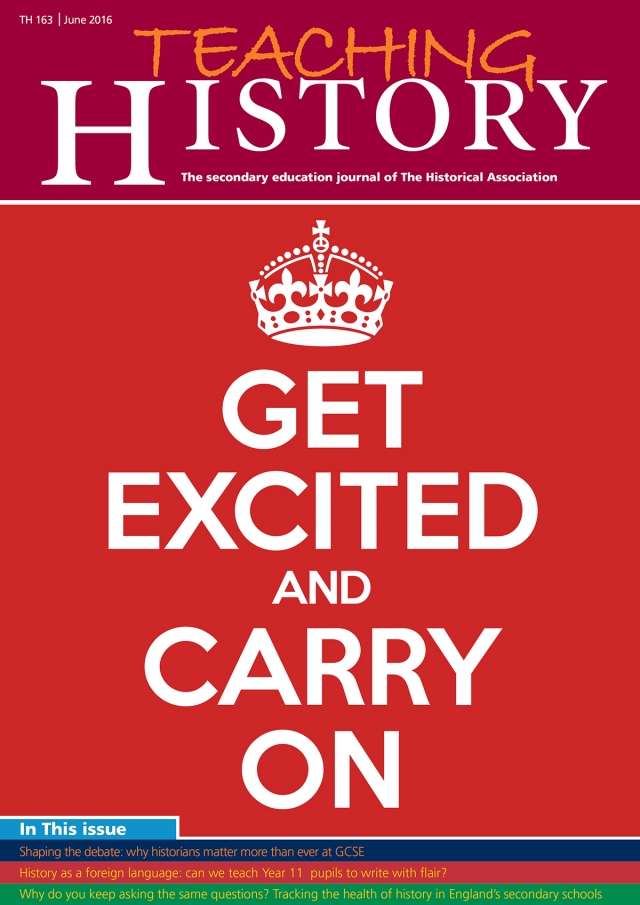Teaching History 163: Out now
Journal News

Get excited and carry on
This edition’s theme, ‘Get Excited and Carry On’ arose in a memorable moment in our December editorial team meeting. We arrived at the meeting knowing that the challenges facing history teachers were legion. In England, these included the huge tasks of planning for a new GCSE and A Level, the juggling of ever-growingpressure for short-term performance with long-term preparation for more enduring higher standards, continued battles with the imposition of whole-school generic assessment systems, and, in many state schools, growing difficulties in recruiting specialist, subject-trained history teachers with sufficient knowledge of much earlier subject developments to be able handle all this in informed ways. Equivalent challenges, and many more, seemed to dog history teachers in other parts of the UK and beyond.
Yet as we reviewed the article submissions and proposals, we were also struck by the optimism, dynamism and intellectual productivity of history teachers. Many history teachers are both tackling and transcending these surface changes. They continue to read each others’ published work in articles, books and blogs. They continue to mine historical scholarship for inspiring content, for new challenges to old assumptions and for new definitions of excellence in historical writing and study. They continue to generate new ways of enabling all students, especially those who struggle, to think historically, to embrace new knowledge and to examine the past with fresh humility.
Nor is this necessarily a separate, parallel track of productivity unrelated to a darker world that sees high standards compromised by genericism, bureaucracy or managerialism. Many history teachers are facing the latter issues head-on, and turning them into opportunities to continue the more fundamental and lasting work of theorising solutions to history-specific challenges. One of our team observed that what we are seeing is not ‘Keep Calm and Carry On’ but ‘Get Excited and Carry On’. Articles in this edition share both that intellectual excitement and the resulting practical solutions.
In her ‘Cunning Plan’ for thematic teaching at GCSE, Sally Thorne chooses to avoid easy or well-trodden options. Drawing on her own earlier explorations in teaching medicine and crime and punishment, she encourages other history teachers to use the new courses as an opportunity to think differently about structuring content. In his ‘Cunning Plan’, Michael Fordham sets out advice and encouragement for all those wanting to stretch both their own knowledge andthat of their students by teaching medieval history at A Level. Rachel Foster and Kath Goudie tackle head-on the typical shortcomings of GCSE papers. Faced with an examination question that seemed to preclude argument, Foster and Goudie used historical scholarship both to identify a better line of historical enquiry and to define a properly historical response to it. They argue that by avoiding narrow and
unhistorical questions, and by continuing rather than interrupting the rigour of Key Stage 3, they ultimately prepare all students more effectively for success at GCSE.
Ruth Brown, Geraint Brown, Matthew Stanford and Corinne Goullée move us into territory hitherto under-explored in history education circles – the work of the teaching assistant. As a team, they analyse what makes for a wonderful teaching assistant and share their department’s principles for collaborative working, but they have a new take on the issue: subjectspecificity. When a teaching assistant devours history books and a department involves such a teaching assistant fully in its discussions, including those on
content, everything changes. While acknowledging how unusually fortunate they are to have a remarkable TA in Ruth Brown, these authors offer advice to help other history departments draw their TAs into a vibrantly subject-specific departmental culture.
Both Jim Carroll and Claire Simmonds continue the history education community’s longstanding tradition of exploring the role of writing in learning history. Carroll responded to literacy errors in Year 13’s writing, not by tackling literacy in isolation, but by teasing out principles of historical discourse that underpin grammar. Meanwhile, Simmonds began with frustration at her Year 11’s dull and boring essays. Convinced that the ubiquitous acronym ‘PEEL’ makes everything worse, she carried out a short term intervention designed to foster more mature, interesting and divergent historical writing. Thus she has started her students on a road of escaping completely from jigsawing together GCSE answers using formulae.
Katharine Burn and Richard Harris contextualise such developments with the findings of the HA annual survey. They suggest reasons to be cautiously positive about the state of history education in England. History’s position in the lower secondary curriculum now appears to be more secure, as is take-up at GCSE. But perhaps the most encouraging sign is the reversal of a trend towards restricting GCSE uptake for low-attaining students. For now, at least, it appears that ‘the risk of history becoming the exclusive preserve of high-attaining students may have been averted’. Burn and Harris also explain why it is so important for history teachers to keep completing the survey. Comprehensive and timely surveys of history teachers’ views and experiences are vital if we are to discern worrying trends and, crucially, to have a sound evidence base with which to report them. And plenty of developments still give cause for worry. Where history departments are being pressed to use assessment systems which ride roughshod over lessons from the 1990s, defy research and ignore detailed debates by history teachers, we know we have work to do in fighting for history’s standards. May this edition of Teaching History inspire you to get excited, carry on ... and stay vigilant.
Click here to access Teaching History 163...

